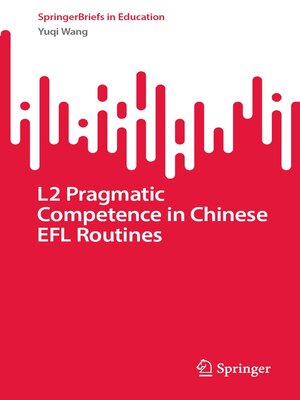
Sign up to save your library
With an OverDrive account, you can save your favorite libraries for at-a-glance information about availability. Find out more about OverDrive accounts.
Find this title in Libby, the library reading app by OverDrive.



Search for a digital library with this title
Title found at these libraries:
| Loading... |
This book adopts a cross-sectional approach and mainly focuses on one of the core pragmatic constructs, formulaic/pragmatic routines, in addition to components put forward by Roever (2011) and Taguchi (2013). It actively integrates multidimensional pragmatic modalities—including both production (initiating and responding) and reception (recognition, comprehension, and perception), together with learners' cognitive processes—rather than one or two types of task modalities. Focusing more on the Chinese EFL context instead of Japanese or European L1 learners, it also takes advantage of an emerging instrument, the computer-animated elicitation task, for data collection based on authentic oral responses and to avoid "coached" responses. The socio-cognitive approach, proposed by the famous linguistic expert Prof. Istvan Kecskes, is subsequently applied to conduct an in-depth analysis of the data. Hence, the book introduces a new and fruitful theoretical perspective to the traditional L2 pragmatic research field.






